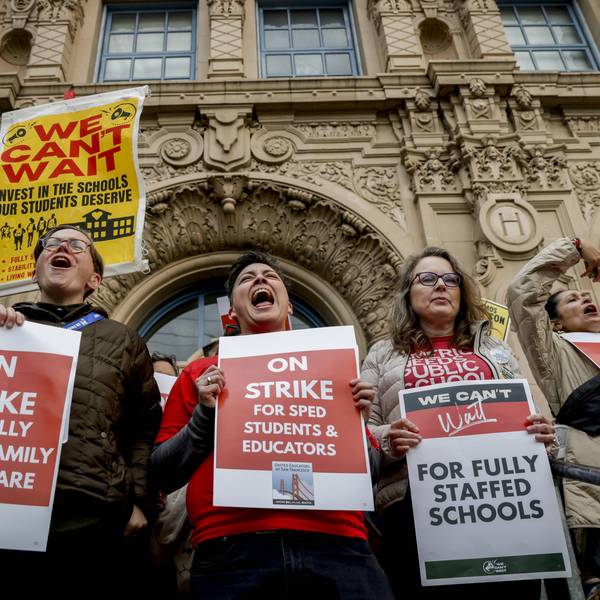Despite threats from education officials and lawmakers, thousand upon thousands teachers across Colorado and Arizona staged walkouts on Thursday after spending weeks calling attention to low teacher pay and insufficient school funding--and following similar protests in numerous other Republican-controlled states.
"Our students, educators, parents and communities have been backed up against a wall for more than a decade," Ralph Quintana, president of Arizona's chapter of the American Federation of Teachers (AFT), said in a statement as the union prepared to strike.
Arizona's walkout--the first in the state's history, drawing an estimated 50,000 educators--follows weeks of "walk-ins," in which teachers promoted the hashtag #RedForEd and wore red to protests outside school hours, joined by parents, students, and other supporters.
The state's teacher salaries rank 43rd in the nation, according to the National Education Association, and school funding was cut drastically between 2008 to 2015, following the economic meltdown and recession. Arizona currently spends 13.6 percent less per pupil than it did 10 years ago, adjusted for inflation.
Despite an offer of a 20 percent pay increase by 2020 from Republican Gov. Doug Ducey, 78 percent of the state's teachers voted last week to stage a strike to signal that their grievances are about the quality of education Arizona children are receiving while the state offers $100 million in corporate tax cuts.
As the demonstration drew near, the state superintendent of schools, Diane Douglas, reminded teachers that a strike would be illegal, and threatened to revoke teaching certifications for those who walked out.
The threat may not have carried much weight with the state's educators--considering Arizona's teacher retention problem is so dire that schools have started hiring uncertified employees to teach.
Eight hundred miles northeast of the main #RedForEd event in Phoenix, thousands of Colorado teachers assembled at Denver's Capitol building for the first of two days of protests.
Earlier this week, two Republican state lawmakers introduced a bill to punish any educators who participated in the strike, with fines, firing, or up to six months in jail. State Senate Democrats denounced the proposal as "anti-worker trash," and teachers were not deterred from protesting.
"Certainly what happened in West Virginia, Oklahoma, Arizona, Kentucky has fired up public school educators but the truth of the matter is we've been suffering from cuts in our schools and classrooms since 2009," Kerrie Dallman, president of the Colorado Education Association, told the Denver Post. "The fact so many are coming [to Thursday's walkout] is a real testament to the growing frustration of public school educators in the state of Colorado."
Despite Colorado's healthy economy, the state's teacher salaries rank 46th in the nation. Teachers are paid 22 percent less than the median income, according to the Bureau of Labor Statistics, and schools are underfunded by $822 million annually, according to Dallman.
"The starting salary in some districts is $29,000. We have educators paying 80 percent of their take home pay just on basic housing costs, student loans, buying food for the table. That is not okay," Dallman told DenverChannel.com.
The two state's strikes are part of a wave of uprisings by teachers that began in late February, starting in West Virginia and moving through Kentucky and Oklahoma. Teachers in Indiana have reportedly been discussing the possibility of a strike, noting that its average per-student spending of $7,538 is one of the lowest in the nation.




